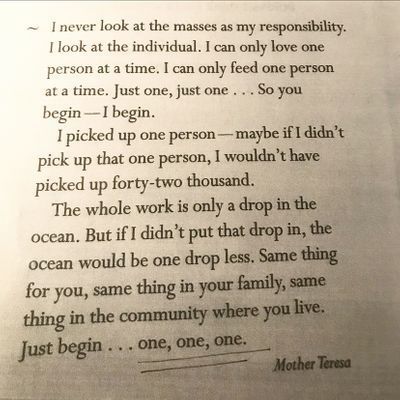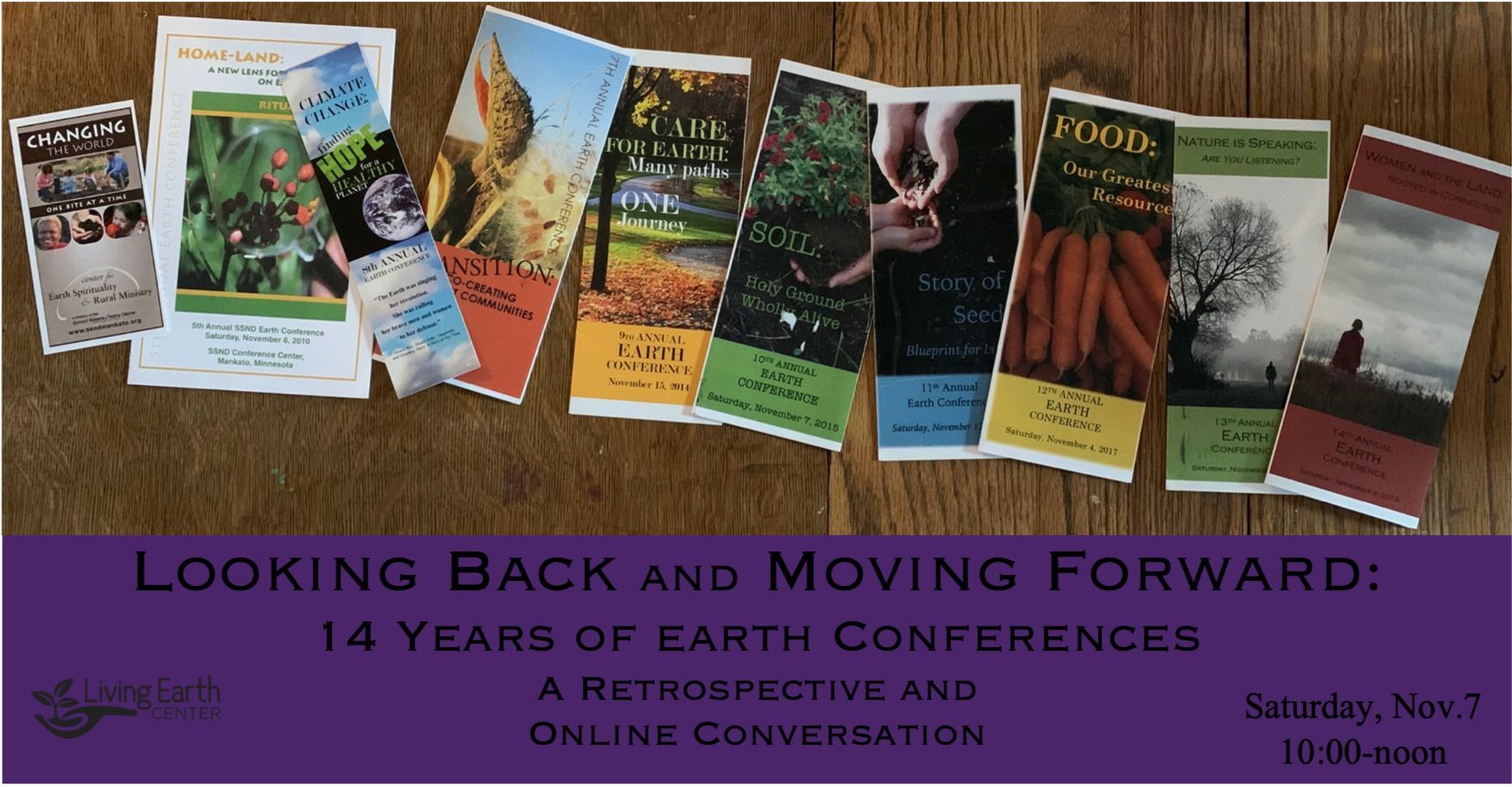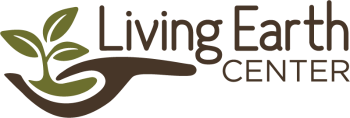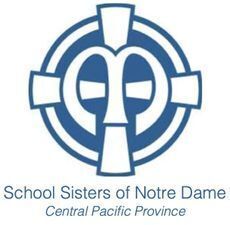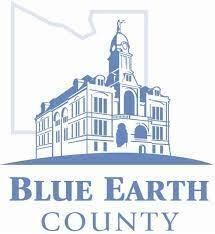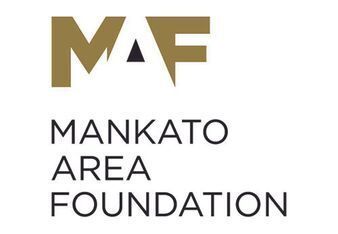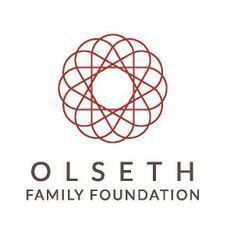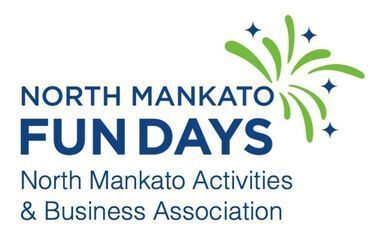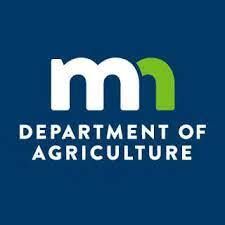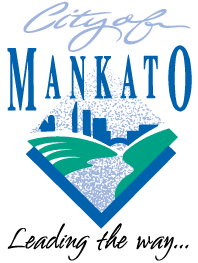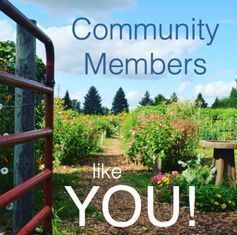15th Annual Earth Conference - Looking Back and Moving Forward: 14 Years of Earth Conferences
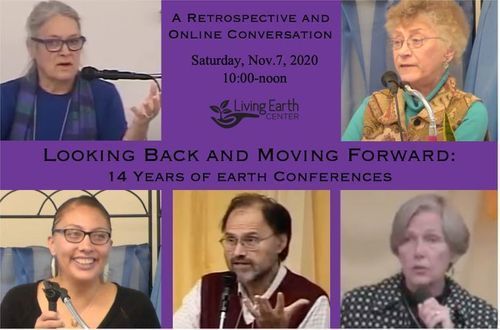
Due to the global pandemic, Living Earth Center was unable to host its Annual Earth Conference in 2020, but it didn't feel right not to do anything at all...
What the Earth Conference Task Force came up with was a compromise called, "Looking Back and Moving Forward: 14 Years of Earth Conferences."
Participants were invited to join via zoom and take a look back at video clips of highlights from past conferences, then participate in a conversation about how those lessons from the past can be applied to both our present situation and our world as it continues to move forward and evolve.
Together we explored how themes such as community and diversity, originally applied to conference topics like Food and Seed, were also applicable in 2020, a time of a global pandemic and social unrest.
This virtual gathering made the best of what was a difficult situation for everyone. The greatest loss from going online was there was no way to virtually share Sister Gloria's traditional delicious conference-opening muffins.

Over 60 participants came together via Zoom, 23 SSND Sisters who were located on the Mankato Campus. The Sisters met in three separate rooms to adhere to social distancing guidelines and watched the presentation together on a large screen.
Opening Reflection
The Conference opened with an original poem written by Mankato-based poet and writer Esther Marcella Hoffman.
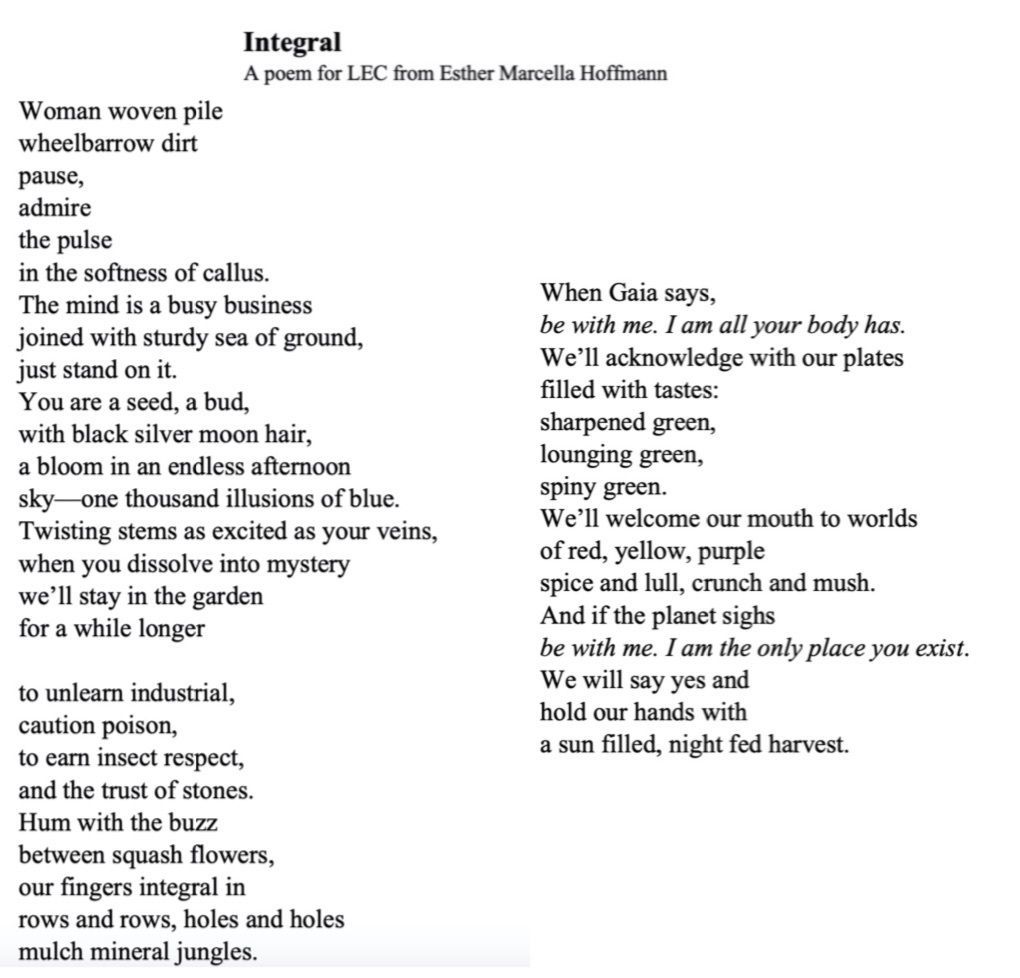
First Speaker Highlights - Audrey Arner
Audrey Arner spoke at our 2015 conference Soil: Holy Ground, Wholly Alive and is the co-owner of Moonstone farmers. She is a river friendly farmer, community organizer, former program director for Land Stewardship Project for western Minnesota, founding organizer of Sustainable Farming Association, served as President of the Board for Midwest Organic and Sustainable Education Service (MOSES) and the recipient of numerous environmental awards. In her 2015 keynote address she explored the innate relationships and interdependencies that support soil health and our own well being.
After each speaker's clip, participants went into breakout discussion groups to share what stuck out for them and how what the speaker said pertains to today. Here are the takeaway points from the discussion groups:
- If we fix the soil, we fix all of it. We can hold the carbon in the soil.
- Our relationship with the land has changed and planning for the future is important.
- Keep soil covered and don’t use chemicals.
- We need to make sure the land is suitable for the crops grown on it to help prevent soil erosion.
- We live in and on soil. We need to approach soil in a learning mode.
- We must ask the sand, the gumbo, the black fertile soil, "How can we live together in a mutual relationship without exerting control and demanding soil to be what we humans want it to be for our own gain."
- As with everything we are experiencing today, we need a change in mind-set recognizing the importance of soil in our lives. As Audrey said, we “must live in the earth, and it in you.”
- Under the current administration, industry, not the farmer, has been privileged. We need to reach out to the industrial sector. And the federal government needs to subsidize farmers who make healthy, good soil.
- Advocate in your community and buy local – support farmers who care for the soil.
Second Speaker Highlights - Bruno Borsari
Bruno Borsari spoke at our 2016 Conference The Story of Seeds: Blueprint Life. He earned his Doctor of Agricultural Science degree from the University of Bologna in Italy and his Ph. Degree from the University of New Orleans. He is presently Professor of Biology at Winona State University. He taught and practiced ecological farming, agroforestry and prairie restoration in various countries for 30 years.
In this lecture Bruno presents “The Story of Seed” with a sense of sacredness and awe. He reflects on the power, issues, and metaphors of seeds. He explains how seed selection, conservation and propagation, ultimately shape our culture and who we are as human beings. He challenges us to find our role in restoring the true knowledge of seed and cautions us to safe-guard bio-diversity which we are losing as a result of frenzied efforts to manipulate seed, creating an unhealthy mono-culture.
Breakout groups discussion takeaways:
- Seed existed long before the human species came to be.
- As we wipe out diversity in nature through genetic modification, we transfer that "wipe-out" effort to our cultural differences, promoting the idea that diversity is a problem in our living patterns and we need to get rid of it.
- We live in a world of abundance, but people are hungry.
- Everything starts with the seed. It teaches us patience, renewal, tenacity.
- Everything is becoming homogeneous. Diversity is shrinking and it is dangerous.
- Seed saving should become a movement. Promotes food security, community and cooperation.
- We have this expectation that everything external to us should bend to our will. This also applies to relationships with people.
- Pandemic has shown us the importance of seeds. More people are gardening to combat food shortages.
- Diversity of all kinds has been challenged in the last few years. We need to celebrate the diversity of soil as we celebrate the diversity of people.
- The dominant narrative in our country has moved away from the environment. Industry (genetic modification) is forcing the seeds to adapt to us. There will be consequences; there have been consequences.
- We are a split country right now. We need to work together in all areas. One area is the protection of seed. Cooperate with others. Share seed!
Third Speaker Highlights - Mary Jo Forbord
Mary Jo Forbord was keynote speaker for the 2017l Earth Conference, Food: Our Greatest Resource. She works as the Healthy Eating Coordinator at the University of Minnesota, Morris. She has served as Director of the Sustainable Farming Assn of Minnesota and as Chair of the Hunger and Environmental group of the American Dietetic Association. Mary Jo and Her husband Luverne are 5th generation Minnesota farmers. They graze cattle and raise fruits and vegetables on their organic farm in the Upper Minnesota River Watershed.
Reflecting on her own experiences within the food and farming systems, Mary Jo will address how we can once again find nourishment for our food—nourishment not only of our bodies, but also of our families, our eco-systems, and our very souls. Mary Jo says,“If we do our very best to sustain the splendid diversity of life teeming in the tall-grass prairie, humankind can be sustained in this place we call home for generations to come.”
Breakout groups discussion takeaways:
- We commented on the current rollbacks in school nutrition programs. The next administration needs to restore those programs.
- Key to those nutrition programs is the farm to school program.
- In addition, we have to teach our children “how” to grow food.
- The First People have much to teach us about living sustainably.
- Feeding people well is very important now to help combat the virus.
- We are being shown that we are not in charge here.
- We are still narrowing diversity. It is all corn and beans, no crop rotation.
- Science & relational element- being in right relationship and allowing for variety are important.
- Nature is a gift that invites us to keep on discovering with others how to utilize what exists in nature for our nourishment.
- Other cultures have much to teach us about natural foods that could nourish us.
- Products injected with preservatives and adorned in plastic wrap have become a commodity.
Fourth Speaker Highlights - Megan Schnitker
Growing up in South Dakota, Meghan Schnitker received a strong foundation in Lakota teachings and traditions from her parents Charles Wayne and Martha Bull Bear. She now lives in Mankato where she runs the Mahkato Revitalization Project, a non-profit focused on preserving and sharing Lakota and Dakota culture and language through educational outreach programs
In our 2019 Earth Conference, Women and the Land: Rooted in Connection, we explored the inherent and sacred bond women of the past, present, and future have with the land.
In her talk, Megan connected us to the past and unearthed the roots of this deep connection between women and the land. She explored past traditions across cultures and time periods that have nurtured and grown this connection. She discussed what has gone awry and how our modern society has moved away from honoring this sacred bond. By learning about our past we can begin the process to heal the rift that separates us from the land and from one another.
Breakout groups discussion takeaways:
- Oneness with EARTH is a way of being; it is spirituality.
- Re-surfacing the principles of the lifestyle of early women teaches us that our pursuit of God/ Spirit is on target when we are trying to live in harmony with all creation.
- Indigenous people saved seeds and spread them to make sure the plants they needed would grow where they were. They used plants as food and medicine.
- They had a healthy relationship with the land and taught land stewardship.
- Today we are moving too quickly for our spirits to want to stay in our bodies. We don’t make good decisions from this place. We are also out of sync with nature.
- Community is needed to help people heal.
- Megan’s ancestors (and she by extension) believed that we all come out of the land and are one with the earth. Yet on a national and world scale, we have lost a sense of unity with animals and plants.
- In the middle of a virus that has challenged our medical community, we must look to the land for ways to heal us. Megan’s example of the mullein plant teaches us that nature is all around us waiting for us to accept what she has to offer.
- The land can give our food the nutrition we need – if we don’t interfere by using chemicals in farming practices.
- We have driven out the spirit of nature. We need to let it back in.
Fifth Speaker Highlights - Kathleen Mary Kiemen, SSND
A second speaker from our 2019 Conference, S. Kathleen Mary Kiemen is a member of the International Religious Community at the Schools Sisters of Notre Dame and former co-director of the Center for Earth Spirituality and Rural Ministry in Mankato (now the Living Earth Center). Presently, she volunteers as an ecology advocate.
S. Kathleen Mary has two masters’ degrees: theology and human development (with a concentration in ecofeminism and women in leadership). Her 50-year ministry has focused on education, social justice, and outreach leadership. In her LAND Talk at the 14th Annual Earth Conference, Women and the Land, S. Kathleen Mary discusses her involvement in advocacy work, her goal of challenging oppressive institutions, and her approach to ecofeminism.
Breakout groups discussion takeaways:
- We have a constant need for systemic change. We need to educate legislators to provide good policies.
- We are all earth. We hope for something better for our future.
- The We vs. Them dominant narrative is very prevalent today. WE need to foster community and collaboration instead.
- WE need to find the balance between dire warnings and hope so that people will listen.
- We need to come together and bridge the great divide. Helping raise awareness can bring people together and promote positive actions.
- We are all longing for the Oneness of All.
- It is not enough to merely bemoan the demons of control and oppression that we name in our culture.
- Not only individuals, but systems as well must be challenged and women individually and together can and are doing this.
- S. Kathleen Mary brought it all home for us and sent us forward with a clear direction. In these troubled times, we must advocate for the environment at whatever level we can.
- We can do this in our daily lives by what we do in the home and community
- And/or we can do this as members of larger organizations that advocate for the environment and work to change public policy. Public policy needs to protect the environment and help shape a healthy relationship between us and the environment
- We must act. We must effect systemic change. It will be an uphill climb: for every two steps forward there will be one step back. But we can’t give up.
Closing Reflection
We closed the conference with the following words from our Executive Director Laura Peterson and a quote by Mother Teresa.
"So you’ve now spent some time connecting with us and looking back, applying to be able to move forward. Part of our closings usually take a moment to call people to action. Nowadays it seems like something requires our work, our help, our support in every direction. It’s easy to get overwhelmed. In the famous (or infamous depending on who you are asking) children’s movie Frozen, Princess Anna- when faced with the probable death of her sister, the complete demolition of her Kingdom, and melting of her best snowman friend breaks into a heart breaking ballad. The chorus… Do the next right thing.
We are at a state of upheaval and uncertainty with many components we cannot control. Traditional Buddhist Dharma says, you can plant the seed without control of what happens after. It is but a wish of good will… In these times, we have a responsibility to ourselves, to each other to our children to do the next right thing. One step at a time.
I will leave you with this quote from mother Teresa… and after that, I ask that you go out into the world and do the next right thing, time and time and time again."
